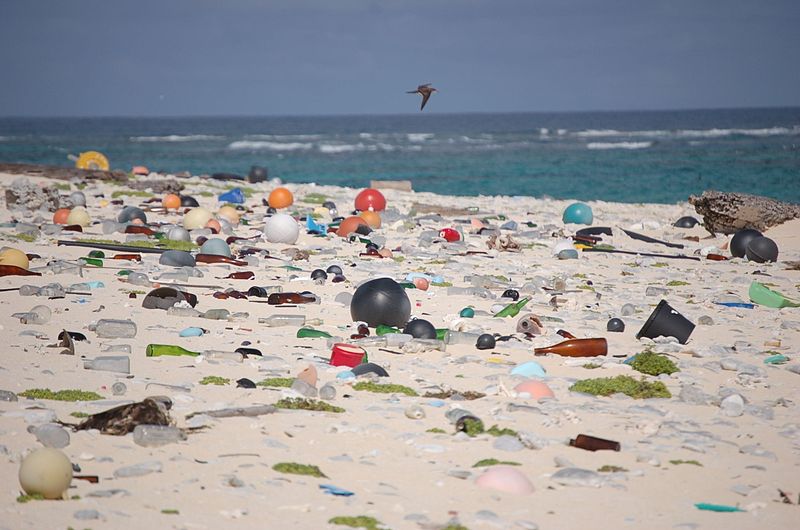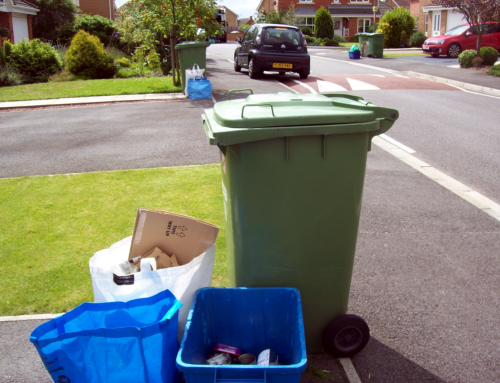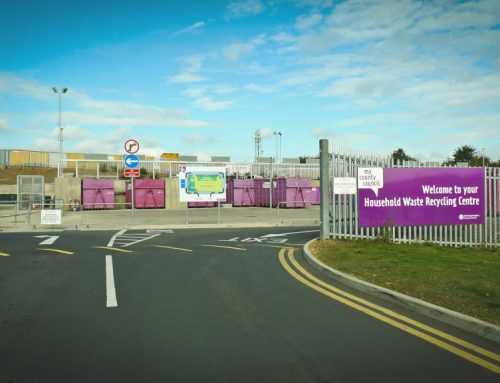by Sarah Baulch
7 minute read
True horror lies not in crumbling Gothic graveyards or the trappings of midnight movies but in the disturbing implications of mundane things. Having spent years researching the impacts of marine debris and long hours looking at pictures of creatures with plastic clogging their stomachs, now when I stand in a supermarket queue and see an endless tide of plastic bags flow from the checkouts to the world beyond all I can think about is where those bags are going to end up.
The plastic bag has become a symbol of our throwaway culture, a visual blight on our landscape littering roadsides, choking waterways and polluting oceans (in which it is just one of many types of marine debris). It is a key example of the failure to accord plastic the real value of its negative impacts, which is reflected in wanton consumption and disposal patterns: non-degradable, rarely recycled and of no cost to consumers, plastic bags are widely disposed of after just a few minutes use. What’s more, the very same properties that have made them commercially successful – their low weight and resistance to degradation – contribute to their accumulation in the environment.
A sea of troubles
In the UK, the number of plastic bags used by supermarket customers has been rising since 2009, reaching an estimated 8.3 billion in 2013. Research by Surfrider Europe found that plastic bags were the third most common type of litter on European beaches, lakes and rivers, and it is estimated that 8 billion bags litter Europe every year. Once loose in the marine environment, the impacts on marine life are drastic and troubling as plastics both entangle and are ingested by wildlife, causing disease and death. For example, over 90% of dead fulmars that are examined are now found to have plastic in their stomachs, and Ocean Conservancy reports that over the past 25 years, 10% of animals found dead in beach clean-ups were entangled in plastic bags.
An emaciated Cuvier’s beaked whale which stranded on the French coast was found to have ingested 378 plastic items, including seven supermarket plastic bags, and on UK shores another such whale stranded with its stomach blocked with plastic. Now there are increasing concerns regarding the impacts of microplastics which, loaded with toxic chemicals, can be ingested by organisms throughout the food chain, from corals and mussels to fish and marine mammals. I’m sure many share my repulsion at the effects our swiftly discarded but irresistibly convenient carrier bags are having in our oceans.
Some may question why our focus should be on banishing plastic bags, since they are not necessarily the most damaging or prevalent litter type. However, the answer is simple: because we can. It is the low-hanging fruit in tackling plastic pollution, and with the success of bans and levies on single-use bags already widely demonstrated it is an effective and achievable first step in addressing the issue of plastic waste.
The bag issue
Certain issues crop up every time bans or levies on single-use bags are mentioned, the most popular being the domestic reuse of plastic bags as bin-liners. Some resource-efficient individuals do indeed use plastic bags as bin liners and when charges or bans are implemented they have to shift to buying bin bags. However, evidence from the Welsh charge demonstrated only a small increase in bin bag sales, amounting to around 4% of the material saved overall, so clearly this marginal increase did not negate the overall success of the levy which saw a drop in carrier bag use of over 70%.
Plastic bag lobbyists often cite a UK Environment Agency life cycle assessment which found that the global warming impact of lightweight plastic bags was lower than that of other types of bags (paper, bags for life, etc.). However, this study did not consider the environmental impacts of non-biodegradable waste and littering, and also found that, if reused, the global warming impact of bags for life quickly falls below that of single-use bags. This illustrates that the fundamental aim of levies and bans must be waste prevention: that is, to reduce consumption of all types of single-use bag. By necessity, measures must therefore be comprehensive and cover plastic and paper alike in order to shift behaviour patterns to the use of reusable bags, rather than substituting one disposable product with another.

Shore thing: large amounts of plastic litter is polluting our oceans and beaches. Photo: U.S. Fish and Wildlife Service Headquarters, via Wikimedia Commons
In 2011, EU Member States invited the European Commission to assess the scope for action on plastic bags, starting a three-year process to agree measures. The Commission’s impact assessment showed that a Europe-wide ban on single-use plastic bags would result in an economic benefit of €899.5 million per year through cost reductions in waste management and for retailers, would reduce oil use by 842,000 tonnes and avoid emissions of 147.6 million tonnes of CO2.
Despite the clear economic, social and environmental gains and overwhelming public support for bans, the Commission proposed relatively weak measures. These were significantly strengthened by the environmentally minded European Parliament but subsequently weakened again during negotiations with EU member states.
A compromise was finally agreed at the end of 2014, with member states given the choice to either introduce mandatory pricing of single-use plastic bags or undertake other measures providing they meet targets of less than 40 lightweight plastic carrier bags used per person per year by 2025. While not an ideal outcome – given that banning single-use bags altogether makes perfect sense – it was nonetheless a step forwards.
Punching our way out of a plastic bag
So, with new EU legislation in place, what has England decided to do? Well, after years of the Government asking retailers to shoulder responsibility they refused to participate in another voluntary agreement and in September 2013 the Deputy Prime Minister announced plans to introduce a mandatory 5p charge for single-use plastic carrier bags from October 2015. While many would have preferred an outright ban, that would have required new legislation, so a compromise was adopted for expediency’s sake. However, the final proposal was riddled with exemptions: not only does the 5p charge apply only to plastic bags (not all single-use bags) but there is also a sizeable exemption for small and medium-sized enterprises (SMEs).
It is difficult to understand why England has chosen to ignore the successful examples set by Wales, Northern Ireland and Scotland which have all now implemented effective, comprehensive levies on all types of single-use bags across all retailers. Instead, the coalition Government plans to introduce a charge difficult for retailers to implement, inconsistent with those found elsewhere in the UK and which, with different rules for different shops and different types of bags, sends a confusing message to consumers which undermines the behaviour change the levy is intended to precipitate.
Defra’s own impact assessment unsurprisingly shows that the greatest economic and environmental benefit would arise from a charge by all retailers. Small business associations actually want to be included in the levy on the grounds that an exemption deprives them of the financial savings of stocking fewer plastic bags and prevents them from recovering costs. But despite criticism from the Environmental Audit Committee, NGOs and businesses themselves the exemption has been doggedly maintained, all in pursuit of adherence to Government policy against imposing new regulatory requirements on SMEs. Never mind that concerns regarding administrative burdens could have easily been resolved by lifting reporting requirements as done in Wales. So in pursuit of a policy protecting SMEs, SMEs are likely being disadvantaged.
Instead of demonstrating leadership and ambition by aiming for the more than the 70% reductions seen in Wales and Northern Ireland, the Government is settling for a target of 50–60%, thereby risking the UK’s capacity to meet EU targets. Only last week, Deputy PM Nick Clegg pledged that the Lib Dems would remove the exemptions if they won the election, a policy which would in turn remove an extra 3.5 billion plastic bags and 328 million papers bags from circulation each year and save small businesses £300m annually. But given the slim chances of a Lib Dem win, this doesn’t fill me with much hope and I can’t help feeling it would have been more meaningful to have made a greater effort to overcome the coalition Government’s short-sightedness this side of the election.
Although falling short of what could have been achieved, I hope that the English charge and EU directive will be the first of many measures introduced to tackle the waste and pollution arising from single-use bags. A strong implementation of the Marine Strategy Framework Directive offers one route, and the proposed EU circular economy package is another beacon on the horizon. We already know many of the solutions for tackling litter and we already have many, although not all, of the instruments in place; what is needed now is the political will to enact and enforce them.






@Phillip Ward – the question of what are the pathways of litter to the aquatic environment is a challenging one. The fact is that there are no established methods for empirically determining what are the most important contributors of marine litter in terms of both source and pathway; with many point sources, and many challenges surrounding quantitatively assessing litter amounts in the environment whether on land, rivers or the sea, it remains a significant knowledge gap.
Probably the most simple schema you can come up with is that every item is deposited in the marine environment either: directly by humans; via transport of wind and water directly over a land/water boundary; or via municipal wastewater, whether foul or surface water sewers. Obviously this is not the whole story and you’d probably want an assessment of source (sector of society/industry) as well as the actual physical pathways to make sense of ‘where it comes from’.
There are a few lists out there that are based on a mix of anecdotes, stakeholder consultation, disparate reports of occurrence, a bit of modelling, and common sense. Not to disparage them – they are good and useful starting points. I’d direct you to UNEP (2009) http://www.unep.org/pdf/UNEP_Marine_Litter-A_Global_Challenge.pdf and Arcadis (2012) http://ec.europa.eu/environment/marine/pdf/Arcadis/Arcadis.zip for these.
But if you want to go a step further and try and assess the relative contribution of these sources or pathways – it’s very, very difficult.
Eunomia looked at methods for doing so as a project for the Clean Europe Network, but sadly, the network has not managed to obtain sustainable funding.
@Sarah – I agree it’s a pattern we see cropping up again and again – a lot of the tools are there but political will and concerted action from all stakeholders – is not. It’s also particularly frustrating not to see lessons learned from other countries applied .
@Peter – I’m sure it’s not lack of interest that induces lack of response, probably lack of time required to address all the wide ranging points in your lengthy comments. I think that probably a divergence of opinion on the desirability of degradability over ability to re-use would explain why many think that any single use bag, whether plastic or paper, should be treated in the same way. Additionally, even a biodegradable bag like a paper bag, or any kind of degradable plastic bag, can cause all sorts of impacts in the weeks, months, and in some conditions, years, that it would take to degrade. For your hypothesis that prohibiting branding on bags would lead to as significant reduction in bag use as levies to be true – there would need to be no or an insignificant proportion of non-branded bags in use – as the measure could only impact branded bags. I don’t have figures but I bet that a significant portion of the market for single use bags is indeed for unbranded bags.
Your article is presented with interesting anecdotes and a plethora of logic some of which cannot be disputed but, and but, it does not seem to end up with a conclusion that offers any real sense of mission. I am (and We are) perfectly aware that there are reasonable people around that would agree with the whole idea of plastic materials in the waste stream as being a nuisance, and this is because it is a convenient substitute for people to use as a means to package and carry goods around. But hold on for a moment, why were plastic bags ever made from fossil fuels to start with? It was never necessary and it was always more expensive than making them from bio-degradable options. You will have read in recent time – MRW (Materials Recovery World) that there has been a lobby made for the Government to step in and support the plastics recycling industry because of low prices. Oh what a shame, when in the hey day of plastics recycling was making huge profits for the industry did these companies say to the same Government and the Local Waste Authorities “oh we have made so much money from this process we will pay some back to you!” I think not.
The waste industry has lived for too long on its laurels! In the good days when it could masquerade its expensive treatment choices across the world through the manipulation of gate (treatment) fees everything was fine and the result was that the prices of processing goes up and the costs have to be subsidised through benevolence of Governments to give out subsidies to treat the wastes through (a) cheap loans, and (b) huge subsidised tariffs for energy production, and (c) pass through clauses that enable the provider of a Service to be paid out again to accommodate changes in legislation that were already known before the plant was installed. The inevitable result has been a sceptical public with an open scepticism to everything they see come out of the industry. Use of oil-based plastics falls in to that category. Now as the industry (and in that we mean the food industry and the purveyors of same) have taken to the issue that plastic bags were a convenient marketing tool for their shops and premises they glibly give them away knowing full well that the result is a direct mechanism for marketing! Make no mistake over this it has always been a marker of the supermarket stores to gain a foothold in advertising this way.
Just take a look at which supermarket chain uses orange plastic bags, or those that play the blue stripes or those with the green image or those that have impeccable writing conveyed in a class of their own! Do you get it? Of course you do – so how about enforcing and removing any advertising away from these plastic bags, and making them all one colour! It doesn’t work you may say! Nonsense of course it does work, and albeit a bit late in the day, it could have been implemented very easily, just as the revision to labelling of packets of cigarettes would have done had it been implemented earlier and which has been implemented more recently. A single colour “white” plastic bag with no advertising and all made to the same size and standard would have been the quickest route for these purveyors of the current plastic bags to stop making them and using them as a marketing tool, and they would have turned away from them long ago.
It may not be analogous but we in our house-hold (and a few other we know) have attempted to do this by turning the bags inside out and disguising where practicable the coloured coding of the writing, and avoided using at all those awfully tardy orange ones. This has even created a stir in one or two supermarket stores on the way out to be viewed with askance as to what we were doing and on two such occasions have had our entire purchase reviewed to see whether we had taken anything out without payment. Having then been cleared of this “false imprisonment” by the supermarkets in place have then returned to the cashiers’ desks to get a complete refund item by item by item holding up a huge queue of people as a result. Two people can hold up a Supermarket chain to ransom, and it works…frozen foods and all being written off in the process.
Returning thus to the sensible part of the paper you presented and the second comment we made: “why are plastic bags made from fossil fuels at all?” It has never been necessary. We have more than the ability to manufacture them from general organic materials that can be tailor-made and tailor-coded to decay naturally after use by building in a decay process that can be instigate within 12 to 24 hours or up to 12 weeks or more without any difficulty. We are already at the cusp of doing this NOW and the issue is thus solvable. A system that has a double use, a provision for use and a provision for disposal in one, and furthermore they need not cost any more, and almost certainly after a few years would cost considerably less than those made from fossil fuels. Importantly the development (which we have a protected protocol upon its development) can be used for the other packaging uses we see in the food industry just as easily and just as effectively. Plastic bottles for milk, no problem: plastic containers for soaps detergents shampoos cleaning materials, paints and oil and etc. etc. and the likes, again no problem: this is pure chemical engineering and it is here with us now this year. Better still if the Country thought about it before-hand as we had tried to suggest four years ago, we could have seen changes in the market by reconfiguring this issue before the changes now seen in the companies that are clambouring for Government Financial support to the plastic recycling business that these companies are seeking now. For the current industry though this clambouring for support falls upon deaf ears. Recycling plastics is a folly. If you cannot make money out of that business get out of the business.
Charging for plastic bags is an obvious sop to the issues of the day, but 8,300 Million bags at £0.05 per bag would generate £415 Million – for whom? The natural beneficiary is the purveyors of the bags; the second would be the Government. But just as the Land Fill Tax is abused by Government and Waste Industry Contractors and the likes it is too convenient a mechanism to generate an income. The Public has seen through such issues in the past. Now adding to it Paper Bags (as you have also stated) seems totally at variance with your aims and statements. What, Paper Bags are also Plastic Bags? From whence did that mastery of comparison arise? Hopefully you did not intend for that to happen!
For fear of being called up to task about offering comments that are longer than the original article a temporary pause here to give chance for others to raise comments – although – and usually there aren’t that many – as always – out there – just a small group of us – who are interested enough to talk through these items.
I have seen enough direct evidence of the damage plastics do in the marine environment to convince me that this is a problem that needs to be addressed. For all sorts of reasons the Government’s approach to carrier bags in England is bonkers and risks damaging existing recycling operations by actively encouraging the growth of so called “degradable” bags. Unfortunately elsewhere o Isonomia there is a pretty convincing analysis that the government does not intend a robust implementation of the Marine Strategy Framework Directive.
Does anyone know of good research into the pathways by which plastic gets into the marine environment? I would like to understand this better.